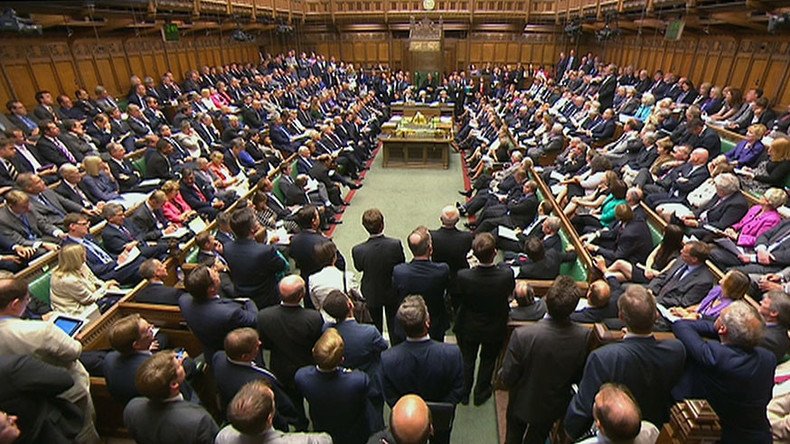British MPs get extra £1,000… their 2nd pay rise in a year

MPs are set to receive a salary boost of almost £1,000 after the independent parliamentary pay watchdog recommended another rise – the second in one year.
The £952 (US$1,376) increase comes just nine months after the Independent Parliamentary Standards Authority (IPSA) signed off a controversial 10 percent pay hike.
This latest salary rise will see MPs’ pay creep up another 1.3 percent to £74,962 per year, with ministers earning an additional £68,000 on top of that.
The decision was made at an IPSA board meeting on January 20. IPSA defended the move as part of a plan to link MPs pay to public sector wages.
Multimillionaire Tory backbencher attacks MPs who oppose pay hike http://t.co/6YrPan7YgOpic.twitter.com/akPyXp38qJ
— RT UK (@RTUKnews) June 8, 2015
However, Shadow Minister for Women Gloria de Piero told the Sun it was inappropriate for MPs’ wages to go up faster than other government workers.
“I’m concerned that yet again this looks like our pay is going up quicker than other public sector workers like police, nurses and teachers. If their pay is capped at one percent, why shouldn’t ours be?”
IPSA has defended the rise by describing it as a “one-off increase,” which now formally links MPs’ salaries to public sector pay.
Labour MP John Mann warned of the repercussions among voters.
MPs with high-salary 2nd jobs ‘less active’ in Parliament, study shows http://t.co/v9CQG89Wo6pic.twitter.com/rP6R6m4uV2
— RT UK (@RTUKnews) March 11, 2015
“We shouldn’t be getting a rise that is bigger than anyone else’s. This will go down very badly with the public,” he said.
Tory MP Charles Walker said the current pay system was the “least worst” option available.
“IPSA went through a tortuous consultation in regards to MPs’ pay. IPSA sets pay rates completely independently [and] decided to link the pay of MPs to public sector pay inflation, which this year stands at 1.3 percent,” he told the Daily Telegraph.
“Regardless of the views of colleagues and the public there has to be a mechanism for setting the pay of members of parliament. The mechanism chosen by IPSA is the least worst of the options available."
No austerity in Westminster: Expenses watchdog upholds MPs whopping 10% pay rise http://t.co/byvuM5hh74pic.twitter.com/W4oYt1ciTl
— RT UK (@RTUKnews) June 2, 2015
IPSA chair Sir Ian Kennedy said the board is aware of public opinion on the issue.
“We were very aware of the views of many members of the public and by some MPs themselves. We listened to those views and made an important change.
“It was right that we made this one-off increase and have now formally linked MPs’ pay to public sector pay.”












